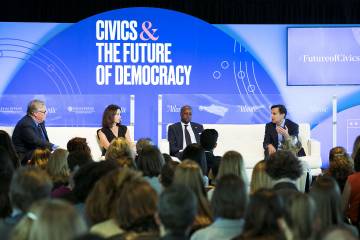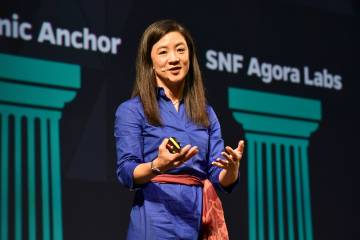Johns Hopkins undergraduate students interested in deepening their understanding of democracy's history, norms, and challenges can explore these and related topics in one of several Intersession courses focusing on democracy.
Intersession, held during the three weeks before the spring semester, offers a variety of for-credit and enrichment courses for undergraduate students to explore new contexts for their academic studies or to learn new skills and concepts.
One of these classes will be taught by Hahrie Han, the new director for the Stavros Niarchos Foundation Agora Institute at Johns Hopkins, which aims to strengthen global democracy through powerful civic engagement and informed and inclusive dialogue. In addition to Han's course, the SNF Agora Institute is coordinating several other Intersession courses taught by institute faculty and experts from outside the university community. These courses focus on civil debate, democracy in the digital age, and Russian interference in the 2016 election.
"Democracy is complicated and multifaceted, and it's being challenged in a variety of different ways," Han says. "Together these classes, along with courses being taught in a variety of departments across campus, aim to teach students to process information, engage with others, and to more deeply understand the history and practice of civic engagement—all of which are crucial to the practice of democracy."
Johns Hopkins University president Ronald J. Daniels, a law and economics scholar who has led Johns Hopkins since 2009, will also teach an Intersession course titled "Do Democracies Need Universities?" In this class, students will critically examine the relationship between universities (including Johns Hopkins) and democracy as they assess how successfully these institutions fulfill their most profound functions—educating students, producing new knowledge, fostering debate, and serving as engines of social mobility.
"Over the last several years, I have been thinking deeply about what universities can do to help renew the democratic project," says Daniels. "In the course we will cover an array of urgent topics facing democracy and higher education and I am truly thrilled at the prospect of thinking critically alongside Hopkins students about the democratic responsibilities of universities like ours."
Intersession courses are available to degree-seeking undergraduates at Johns Hopkins. There is no additional tuition fee for those who were enrolled full-time at Hopkins in the fall semester. Intersession runs Jan. 6-24, and registration begins Dec. 3.
The democracy-themed courses being offered this Intersession are:
In Search of Intelligent Debate
In this course, students will examine the history of debate in the U.S. and analyze different debate techniques to learn how to construct reasoned, fact-based arguments. Students will learn how to listen to competing points of view in order to enhance their ability for informed discussion. The course will be taught by S. Dana Wolfe, a five-time Emmy Award-winning journalist and television and debate producer.
Practicing Democracy
This course explores the history and practice of activism and social organizing. Students will learn about the history and theory of how organizations turn individual resources into collective power and apply these concepts to understand contemporary cases of activism and associationism. The course will be taught by Hahrie Han, director of the SNF Agora Institute and professor of political science, and Elizabeth McKenna, postdoctoral scholar at the SNF Agora Institute.
Russia, 2016, and the Future of Information Warfare
This course examines Russia's operation to influence the American presidential election of 2016 and its impact and implications for democracy, especially during the 2020 election. During the course, students will analyze the polarized American media coverage of the Russian operation and dissect the urgent and contentious issues that evolving technology has created for policymakers and scholars alike. It will be taught by New York Times reporter Scott Shane, who won two Pulitzer Prizes for his coverage of Russia's hacking and interference in the 2016 election.
This Is Not Propaganda
The Information Age carried with it the promise of improving democracy and undermining authoritarian regimes, but the opposite seems to be happening as media manipulation and disinformation run amok. This course examines Russia, South Asia, Europe, and the U.S. to understand how the information environment has been transformed, why methods for resisting manipulation fail, and what needs to be done to create a model in which deliberative democracy can flourish. The course will be taught by journalist, author, and television producer Peter Pomerantsev.
Do Democracies Need Universities?
Modern universities are expansive, complex institutions that play a variety of critical roles in the support of democratic societies. They educate students, produce new knowledge, foster debate, and act as engines of mobility. But they are also the subject of controversy, criticism, and distrust, including for how they have performed these roles. In this course, students will critically examine the relationship between universities (including Johns Hopkins) and democracy as they assess how successfully these institutions fulfill their most profound functions.
Posted in University News
Tagged president ron daniels, intersession, snf agora institute, democracy









